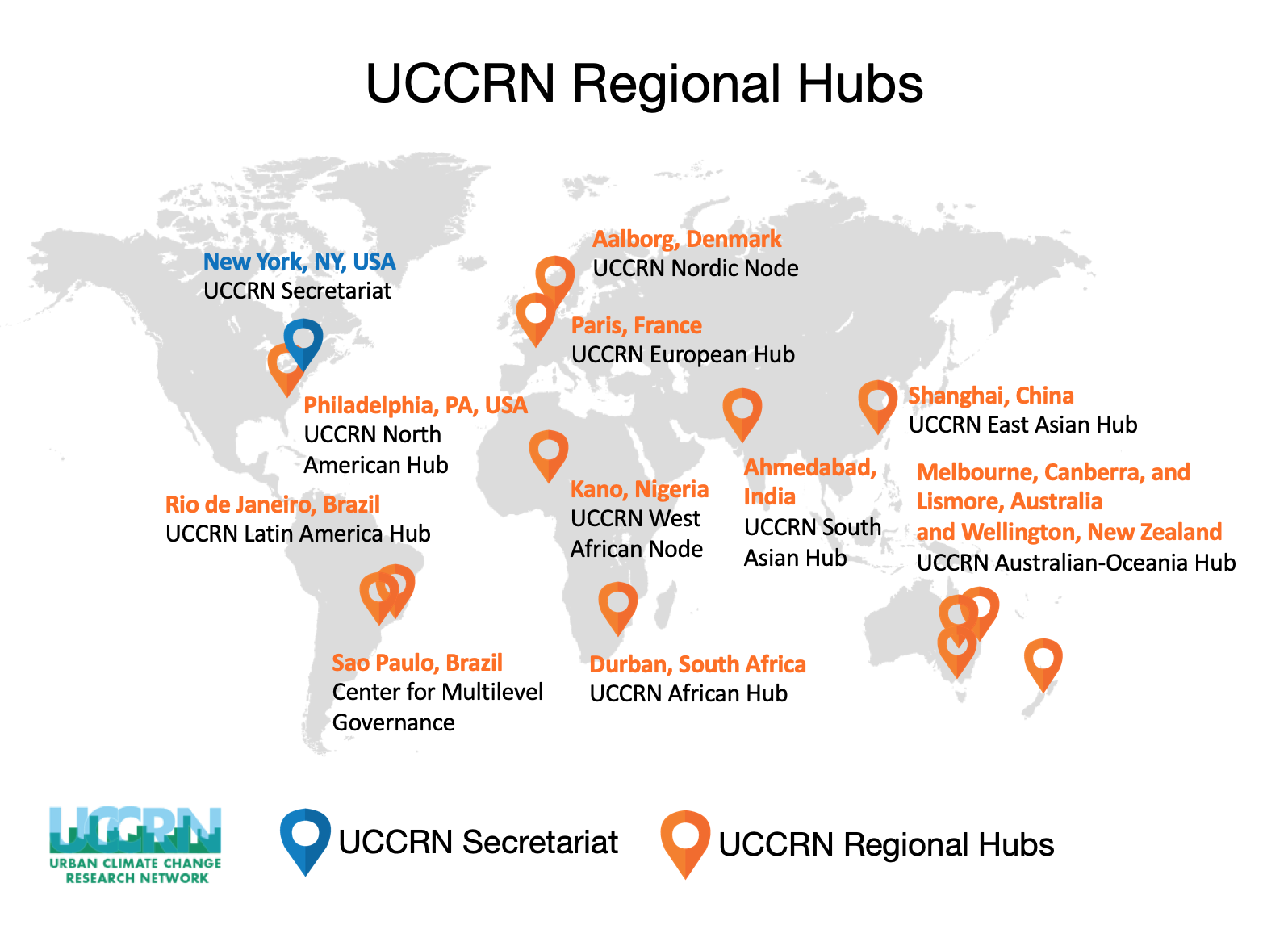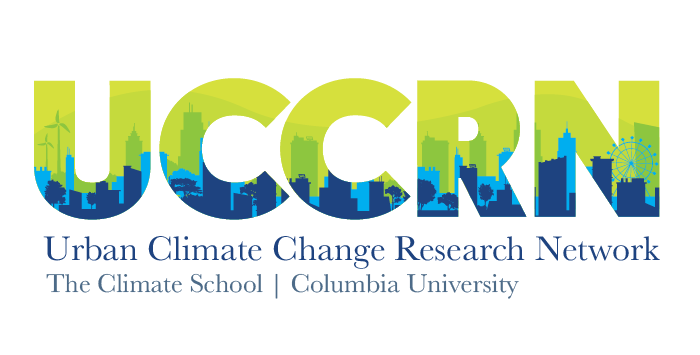Building on a series of scoping sessions with stakeholders and members, UCCRN is transitioning from a report-focused organization to one that leads an on-going, sustained global city-focused climate change knowledge assessment and solutions program. The program is targeted to early, mid, and late-adopter cities through the expansion of the UCCRN to include proactive Regional Hubs, with field directors, program coordinators, and researchers that strengthen ongoing collaborations and knowledge exchange both for and with cities.

The Regional Hubs operate at continental-scale (e.g., Europe, Central and Latin America, Africa, South and East Asia, Australia) and will be linked to other relevant regional and global resource nodes such as the World Meteorological Organization Regional Climate Centers, and the Urbanization and Global Environmental Change (UGEC) Core Project.
UCCRN has actively worked to expand membership geographically (with an emphasis on enhancing the involvement of developing country scholars) and to strengthen specific skill sets in areas where regional capacity is lacking. Both goals will be achieved through the creation of the UCCRN Hubs to provide more geographically-targeted research and support for local researchers and practitioners, who will be recruited from local universities and research institutes in key cities important regions. Our regional work helps us strengthen urban climate assessment and action initiatives.
The UCCRN Regional Hubs serve to promote enhanced opportunities for new urban climate change adaptation and mitigation knowledge and information transfer, both within and across cities, by engaging in a real-time monitoring and review process with cities through on-going dialogue between scholars, experts, urban decision-makers, and stakeholders. These activities are achieved through a combination of cities-based activities and workshops held at international city gatherings and accomplished through regular interactions that include monthly coordination calls, e-newsletters summarizing Hub activities, regional meetings hosted by each Hub every year, and an annual UCCRN meeting rotating through the Regional Hub locations.
The UCCRN Regional Hubs also help us to formalize our urban climate assessment and action framework, allowing UCCRN to update the ARC3 report series on a regular basis with strong links to urban decision-makers worldwide.
Secretariat: New York, NY, USA
- Cynthia Rosenzweig – [email protected]
UCCRN Co-Chair, Head of the Climate Impacts Group and Senior Research Scientist at the NASA Goddard Institute for Space Studies
- Bill Solecki – [email protected]
UCCRN Co-Chair, and Professor; and Founder Director, Emeritus, CUNY Institute for Sustainable Cities
African Hub: Durban, South Africa
- Sean O’Donoghue – Sean.O’[email protected]
Acting Manager, Climate Protection Branch, eThekwini Municipality, Durban
Australian-Oceania Hub: Canberra, Melbourne, and Lismore, Australia + Wellington, New Zealand
- Ken Doust – [email protected]
Director, Windana Research Pty Ltd & Coordinator Eng Management Program, Southern Cross University
- Kate Auty – [email protected]
Commissioner, Sustainability and Environment, Australian Capital Territory/Univ. of Melbourne
- Barbara Norman – [email protected]
Chair, ACT Climate Change Council/Univ. of Canberra - Maibritt Zari Pederson – [email protected]
Senior Lecturer in Sustainable Architecture, Victoria University, Wellington
East Asian Hub: Shanghai, China
- Min Liu – [email protected]
Dean, East China Normal University (ECNU) School of Geographic Sciences, Shanghai
- Xiaotu Lei – [email protected]
Director, Shanghai Typhoon Institute at the Chinese Meteorological Administration
Coordinator: Ruishan Chen – [email protected]
Professor, School of Geographic Sciences, East China Normal University (ECNU), Shanghai
European Hub: Paris, France
- Chantal Pacteau – [email protected], [email protected]
Associate Director, French Consortium of Climate-Environment-Society
- Luc Abbadie – [email protected]
Professor, University Pierre et Marie Curie (UPMC) & Director, Institute of Ecology and Environmental Sciences-Paris
Coordinator: Yann Dusza – [email protected]
Research Engineer, Centre de Recherche en Ecologie Expérimentale et Prédictive (CEREEP)-ECOTRON Ile-de-France
Latin American Hubs
Rio de Janeiro, Brazil
- Martha Barata – [email protected]
Strategic advisor, Institute Oswaldo Cruz (IOC/Fiocruz), Rio de Janeiro
- Emilio La Rovere – [email protected]
Executive Coordinator, Center for Integrated Studies on Climate Change and the Environment at Alberto Luiz Coimbra Institute for Graduate Studies and Research in Engineering (COPPE/UFR), Rio de Janeiro
Center for Multilevel Governance: Sao Paulo, Brazil
- Oswaldo Lucon – [email protected]
Climate Change Advisor to the São Paulo State Environment Secretariat
- Patricia Iglecias – [email protected]
Former São Paulo State Secretary & Lecturer at University of São Paulo (USP)
Bogota, Columbia – in progress
- Juan Camilo Osorio – [email protected]
MIT – Massachusetts Institute of Technology
North American Hub: Philadelphia, USA
- Franco Montalto – [email protected]
Associate Professor, Department of Environmental Engineering, Drexel University, Philadelphia
Coordinator: Korin Tangtrakul – [email protected]
Research Scientist, Drexel University, Philadelphia
South Asian Hub: Ahmedabad, India
- Minal Pathak – [email protected]
Associate Professor, Ahmedabad University; Senior Scientist, Technical Support Unit, Working Group III, IPCC
Nordic Node: Aalborg, Denmark
- Martin Lehmann – [email protected]
Associate Professor, Institute for Planning, Aalborg University
West African Node: Kano, Nigeria (in progress)
- Aliyu Salisu Barau -- [email protected]
Associate Professor of Urban and Regional Planning, Bayero University
